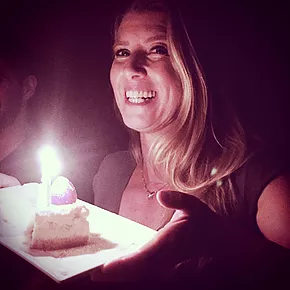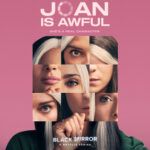This is the first interview in a new series in which Jean-Louis Law interviews entrepreneurs, including creatives, about the issues they face while running their businesses. Today, we are going to speak with Jennifer Nelson, a documentary filmmaker and creative entrepreneur who has been working in the film industry for 16 years. For the past couple of years, she was involved in a lawsuit that will profoundly change the film industry.
Jennifer Nelson: Founder and President of Good Morning to You Productions, Inc.
One of the most popular songs, Happy Birthday to You, or simply Happy Birthday, is sung everyday across the United States at every kind of place – homes, work offices and restaurants. Yet, this iconic piece of American culture has seldom been heard in film or on television due to the exorbitant license fee associated with its use.


Jean-Louis Law: Your line of work is focused on primarily on creativity. How did you switch that focus to begin an entrepreneurial journey and start your own film production company?
Jennifer: I think if you are a creative person, you have your own vision and ideas. It’s unsettling to work for other people and fulfill their vision and ideas. Thus, I think that for me, it was very important to be able to call myself a filmmaker and to see my films come together from scratch based my own vision and ideas. As a filmmaker or entrepreneur, it is important to branch out and take a risk and see what happens when you put your own ideas out into the world.
Jean-Louis Law: Did you form an entity, such as an LLC or a corporation, for your company? If so, what value have you seen in forming that entity?
Jennifer: I have a corporation. This was important because it protects my assets. I was involved in a lawsuit, so was exposed in different ways. If the company that I’m suing tries to come after me, I’m protected by my corporation. They can’t necessarily come after me, in particular, but they can come after my company. I have also seen benefits for billing and tax purposes.
Jean-Louis Law: Why did you decide to create a documentary about Happy Birthday?
Jennifer: Well, that’s been a very interesting journey. The beauty of documentaries is that you have a starting point and you might have a road map, but you really don’t know where you will end. It ends up being an adventure and you discover things along the way.
I had been working on a show for MTV called My Super Sweet 16. We flew around the country and filmed really expensive birthday parties for these kids who were coming of age. This caused me to think about birthdays in a different way. Why are they so important to us? How did this happen? What does all this celebration mean? We sort of take birthdays for granted. We just sing a song and we have these birthdays and it’s something we all share and do. As a result, I started thinking about where did the song came from. No one could tell you who wrote the song. So, I decided to create a short film about Happy Birthday.
During my research, I discovered that Warner/Chapell might not have actually owned (as they claimed) the copyrights to the song. They made close to $2 million a year in licensing fees from filmmakers, like me, who wanted to use Happy Birthday.
Jean-Louis Law: Your lawsuit involving Happy Birthday touched upon three concepts from copyright law: the duration of copyright protection, the public domain (i.e. the place where creative works, after the copyright duration has expired, go to be used by the public at no cost) and copyright licensing. What did you know about any of these concepts before the lawsuit?
Jennifer: Working in the film industry, someone’s birthday always comes up. Whenever you’re filming people for a period of time, a birthday inevitably comes up. When it does affect the story, as a producer, you’re always faced with this decision as to whether to include the song in the film and pay for the song, do we work our way around this issue, or sing a different song. It was a producer issue.
I was aware that you had to pay for the song, but everyone thought it was ridiculous to pay for it because nobody even knew who wrote the song. It’s old. It’s just a part of our lives and our culture. It just came to be sort of folklore where it just evolved because no one can tell you where it came from.
It was just an inconvenient reality that we accepted. I actually did pay a license fee to use the song because I knew I was doing a film on Happy Birthday. But, I then found this article written by a law professor that challenged Warner/Chappell’s copyright claim. That’s what prompted me to think about things in a different way.
Jean-Louis Law: Last September, a federal court decided that Warner/Chappell did not own the copyright to Happy Birthday. In February, a court held that Happy Birthday was in the public domain. What effect do you think these decisions will have on society and other creatives?
Jennifer: Well, I think that these decisions have effects on many different levels. First of all, I think it proves that the little guy can win sometimes. I think that says a lot about the justice system in that it does work. These giant corporations can get caught and be punished for trying to get over on people charging fees for a song that they don’t own. I think that’s a really important message to everyone.
Second, for creatives, I think that because the judge officially declared that Happy Birthday in the public domain, anybody (including filmmakers and radio programs) who wants to use Happy Birthday will be allowed to use it how they want it, where they want it, when they want it and that ultimately frees the song for creative purposes. When the song is not in the public domain, you have to pay for it and that inhibits creativity. People can’t afford to use the song and use something else instead in a scene in which Happy Birthday was an integral part. I think that the purpose of public domain is that work can be used and creative entities can use it in different manners.
Jean-Louis Law: What other projects do you have lined up?
Jennifer: Right now, I’m actually editing the Happy Birthday movie. I am also working on a documentary series about women and strength. I’m really excited about this project, actually. The concept for the film is that over time, women have tried to attain a particular body type that’s not necessarily healthy or natural. In the last two years, there has been this new trend about women getting strong, participating in Olympic lifting and obstacle racing and all these different sports. Women are discovering their own strength, realizing that skinny doesn’t work, and actually being strong feels and looks a lot better. Women are changing their perception of beauty through the process of gaining strength.
Jean-Louis Law: Last question – if you could give one piece of advice to filmmakers or to creatives who aspire to have their own company, what would it be?
Jennifer: Well, I think that it’s definitely scary and risky to branch out on your own. However, I think that once you do it, it’s so rewarding and it feels so great to be able to have your own company, have your own ideas and put them out into the world. I think it’s starting that process is the hardest part, so once you commit to it and things get going and get easier, it’s incredibly rewarding.
Jean-Louis Law: Thank you Jennifer!


